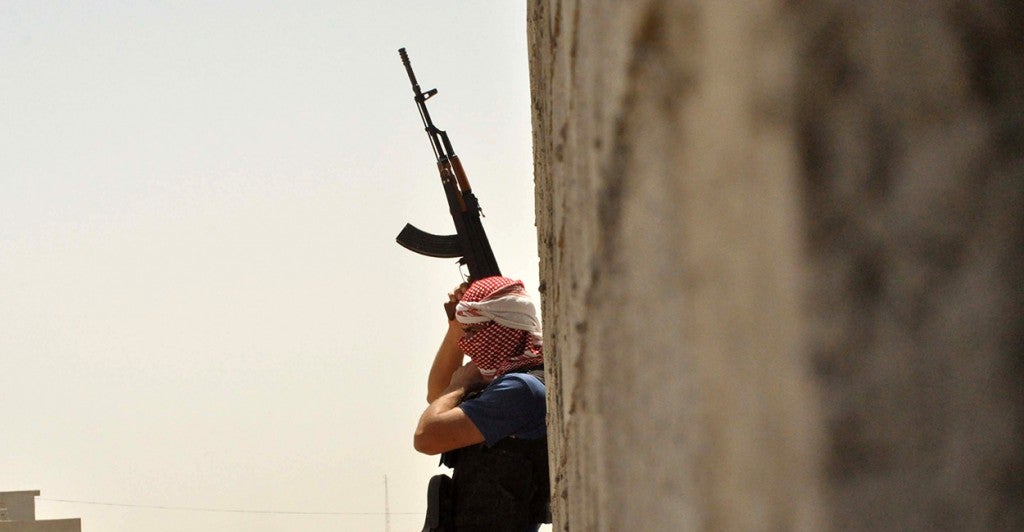Less than three years after U.S. troops left Iraq, political leaders and policy analysts are wrestling with how to respond to the growing turmoil there. But why should Americans worry about the violence and unrest?
James Phillips, The Heritage Foundation’s expert in Middle Eastern affairs, underscores that Abu Bakr al-Baghdadi, leader of the Islamist terror group ISIS, already threatened to attack the U.S. homeland back in July 2012. Should al-Baghdadi’s violent insurgents consolidate their hold on much of Iraq, he will be “in a much better position to carry out this threat,” Phillips says.
In the first part of an exclusive interview with The Daily Signal, Phillips sheds more light on this deadly possibility and critiques President Obama’s record on Iraq.
The Daily Signal: Iraq is culturally and geographically far away from the United States, so why should Americans care what happens? Why not leave Iraq to fix its own problems?
Phillips: Iraq is located in the heart of the Middle East. If it falls to the Islamic State of Iraq and Syria (ISIS), it will offer a well-positioned base for exporting revolution and terrorism to its neighbors, including U.S. allies Turkey, Jordan, Kuwait, and Saudi Arabia. If ISIS expands farther west in Syria it will also increasingly threaten Israel and Lebanon.
Iraq also would be a much more dangerous base for launching terrorist attacks against the United States than Afghanistan, which gave sanctuary to al-Qaeda terrorists before the 9/11 attacks. ISIS, an al-Qaeda offshoot, is a predominantly Arab organization that is better positioned to recruit Arabs and other Muslims from the Middle East and Europe than al-Qaeda was in distant Afghanistan. ISIS leader Abu Bakr al-Baghdadi threatened to attack the U.S. homeland in July 2012 and will be in a much better position to carry out this threat if he is able to consolidate control over Iraq.
Also, Iraq is a major oil-exporting state. If the fighting spreads and disrupts Iraq’s main oilfields in the south, then world oil prices will surge. This would trigger higher gasoline prices and possibly another recession. Since World War II, most of America’s economic recessions were preceded by oil price spikes.
Q: In an earlier interview with The Daily Signal, you said ISIS was on the verge of creating a huge terrorist sanctuary in western Iraq. Do you believe this group is capable of mounting another 9/11-style attack and why?
A: Although ISIS is focused now on consolidating its power in western Iraq and eastern Syria, once it has secured this “Islamic state” it will look for new targets. It already has recruited Americans, according to U.S. intelligence officials. As I said, ISIS leader Baghdadi has threatened attacks against the U.S. He is sure to use any U.S. military action against ISIS as a pretext to justify what he already has threatened to do.
I doubt that ISIS is capable of pulling off an attack as damaging as the 9/11 attack, but it is increasingly capable of launching attacks against Americans throughout the Middle East and Europe, where it also has recruited followers.
Q: To what extent is the current crisis the fault of President Obama and his decision not to keep U.S. troops in Iraq?
A: The Obama administration bears a heavy responsibility for helping to create the conditions in which ISIS is now thriving. The administration underestimated the threat posed by al-Qaeda in Iraq and overestimated the ability of Prime Minister Nouri al-Maliki’s government in Baghdad to address political and security challenges.
When it came into office, the Obama administration made clear it was more interested in a quick exit to “end” the war, rather than staying the course to consolidate the hard-won security gains of the surge in U.S. troops, which President Obama, Secretary of State Clinton and Vice President Biden had opposed as U.S. senators.
Politics trumped long-term security interests: The White House repeatedly ignored the advice of military commanders on the ground and ordered a rapid drawdown of U.S. military forces according to a timetable driven by domestic political considerations. It overruled the Pentagon’s recommendation that a residual force of 10,000 troops be maintained to train, advise, and assist counterterrorism operations after the December 2011 withdrawal of combat troops.
Instead, the White House proposed that only 3,000 to 5,000 military personnel be retained in Iraq. This undermined the incentives that Iraqi political leaders had to take political risks to support a continued U.S. military presence.
As Heritage Foundation analysts repeatedly warned, the abrupt U.S. troop withdrawal in 2011 deprived the Iraqi government of important counterterrorism, intelligence, and training capabilities that were needed to keep the pressure on al-Qaeda. This allowed it to regain strength in a much more permissive environment.
Next: In Part 2, James Phillips shares the strategy he thinks the Obama administration should adopt, saying “it may be too late” to achieve some U.S. goals.
For more of James Phillips’ insight and analysis:
- Q&A: What You Need to Know About ISIS in Iraq
- The Iraq Meltdown: What Next?
- Iraq: Fall of Mosul Spells Disaster for U.S. Counterterrorism Policy
- To Defeat al-Qaeda in Iraq, Stronger Cooperation Needed
- Al-Qaeda Resurges in Iraq
